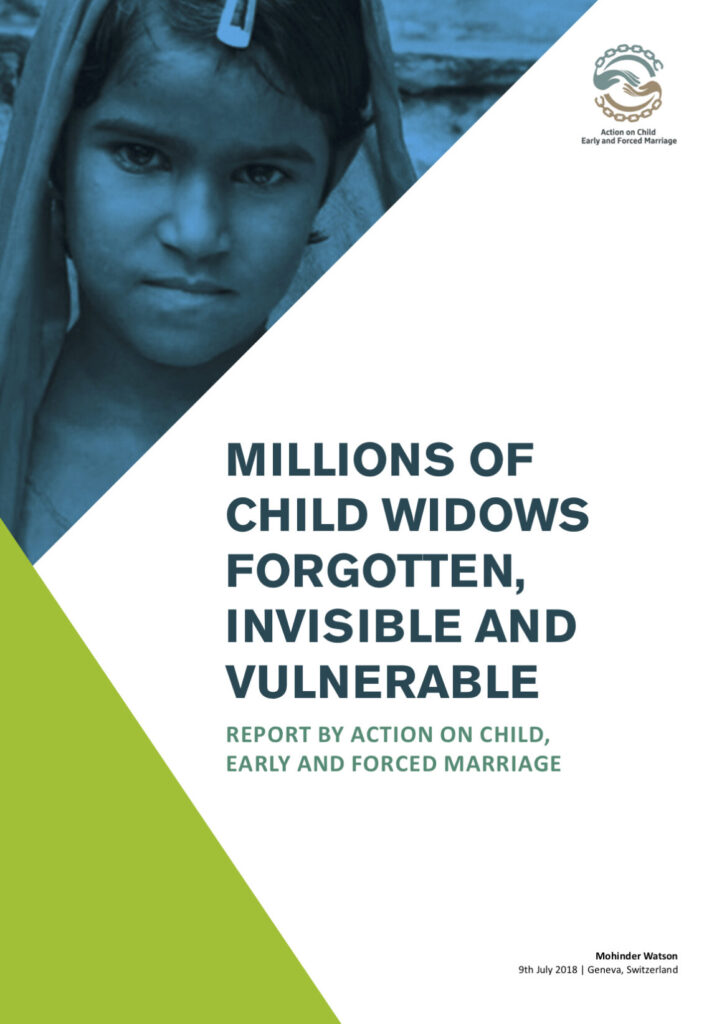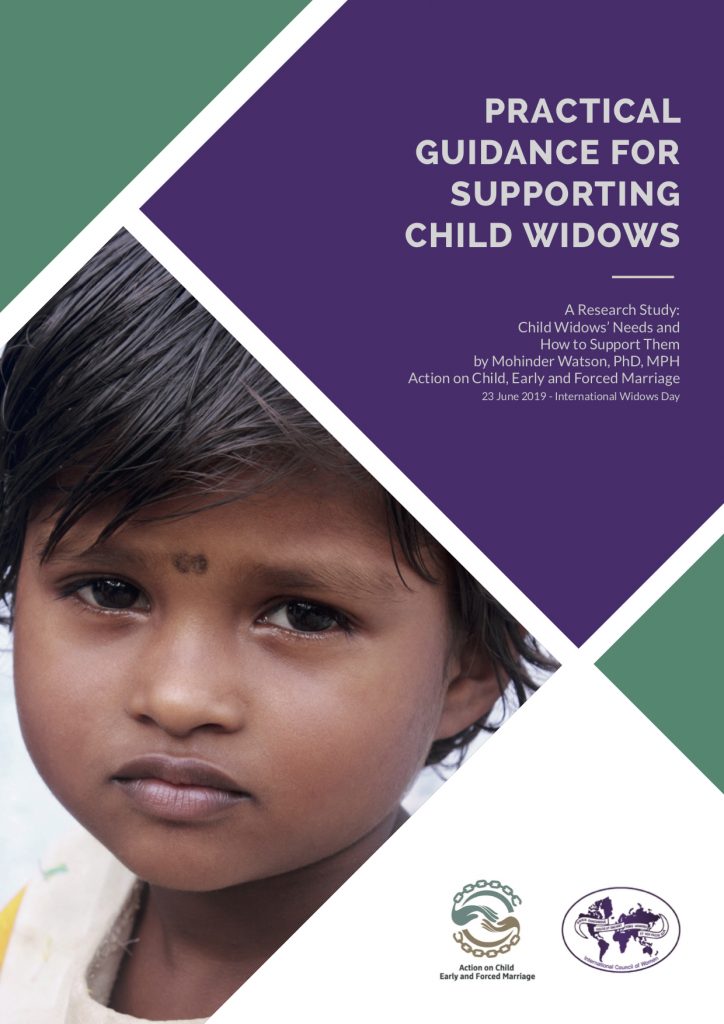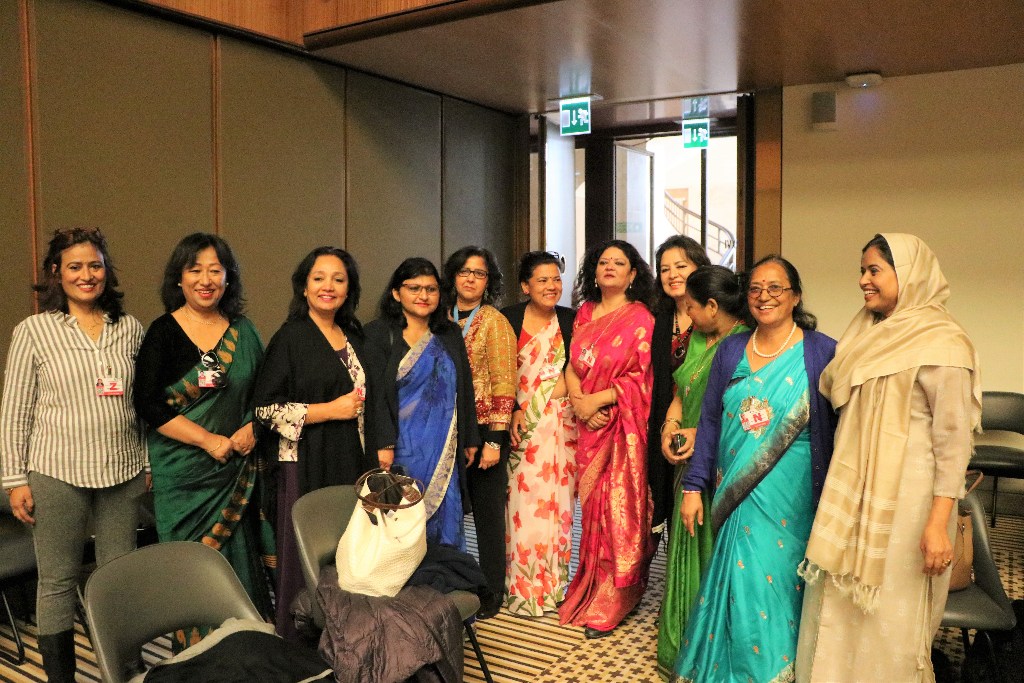June 23rd 2021 International Widows Day
On this 11th annual International Widows Day, we celebrate the lives of the millions of widows around the world and bring awareness to the myriad of human rights violations and forms of discrimination that they face each day. Moreover, we recognize the more than a million child widows—girls who were married as children and whose husbands have died before reaching the age of 18. Too often, these young girls remain forgotten and vulnerable to abuse and exploitation, and it is the responsibility of the international community to give voice to this often invisible population.
March 2021 65th Commission on the Status of Women
This year Action on Child, Early and Forced Marriage celebrated CSW 65 virtually with two parallel events on VAWG and COVID-19 and child marriage and widowhood. These events brought together a wide range of experts from the UN, NGOs, and survivor-advocates with the goal of sharing knowledge and spurring action to build back better after the COVID-19 pandemic.
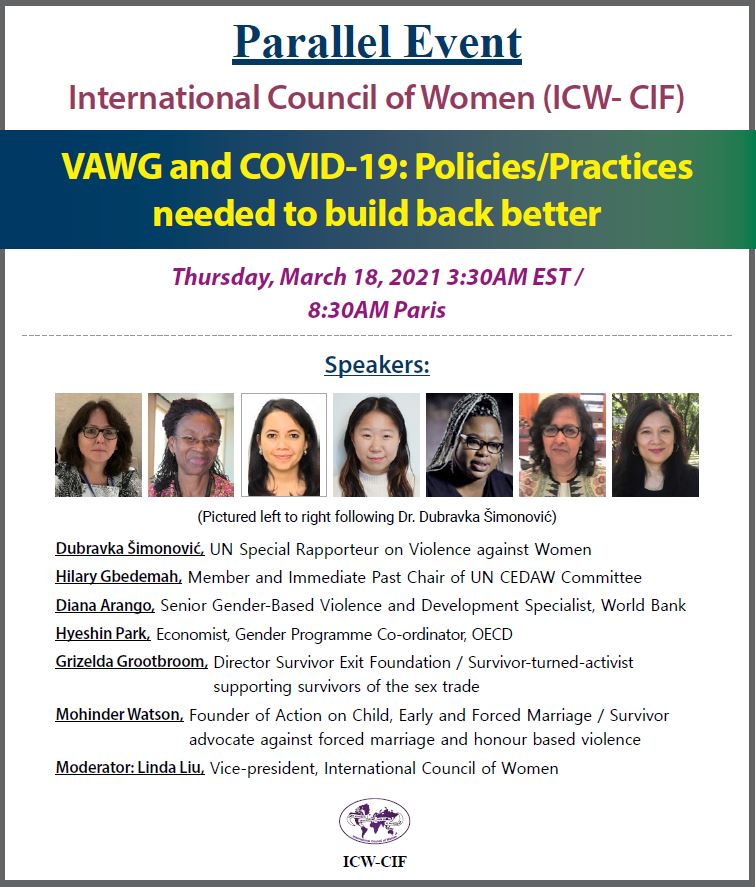
On 18th March, 2021, the ICW held a successful parallel event during CSW 65 on ‘VAWG and COVID-19: Policies and Practices Needed to Build Back Better.” Speakers included Dr Dubravka Simonovic, the UN Special Rapporteur on Violence against Women; Hilary Gbedemah, CEDAW member and immediate past president of the CEDAW committee; Diana Arango, a GBV and Development Specialist at the World Bank; Hyeshin Park, Economist and Gender Programme Coordinator OECD; Grizelda Grootboom, a survivor turned activist supporting survivors of the sex trade and Mohinder Watson who spoke about forced marriage and honour-based violence. The panel was moderated by Linda Liu, Vice President ICW.
- Dr Dubravka Simonovic noted that as early as March 2020, amidst reports of increasing domestic violence during lockdowns, she had issued a statement to governments asking them to continue to provide services for victims of domestic violence during the pandemic. During the first wave of the pandemic, while some states did continue to provide services for victims of GBV, many did not consider shelters as essential services and closed down or scaled back such services and also cut funding to organisations providing such services. COVID-19 has negatively affected the sexual and reproductive health and rights of women and girls with some governments restricting access to abortion, considering it a non-essential medical procedure.
- Hilary Gbedemah highlighted the important role CEDAW plays in protecting women and girls from all forms of violence. CEDAW Generation Recommendation (GR) 19 highlights that violence is a form of discrimination as it is violence carried out against women because they are women. She said the COVID restrictions were gender blind in many parts of the world as the mobility restrictions imposed ignored the fact that many women’s lives depend on outdoor activities and gathering together such as in the marketplace. She said the informal sector is essentially an outdoor sector, so the mobility restrictions impacted women disproportionately, especially those who were already disadvantaged.
- Grizelda Grootboom shared her moving story of growing up on the streets in Cape Town, South Africa and then moving to Johannesburg in search of employment and a new life, only to find that a school friend had set her up to be trafficked. After being drugged and sexaully assaulted, she was eventually thrown out in the middle of the night and with no money or shelter, and she ended up in a life of prostitution which eventually led to drug trafficking. The NGO Embrace Dignity helped her to leave behind this world.
- Hyeshin Park’s presentation on tackling social norms to prevent VAWG centered on the launch of the OECD’s latest report Man Enough? Measuring Masculine Norms to Promote Women’s Empowerment. Among the root causes of VAWG, restrictive masculinities are an important factor since some masculine norms hinder women’s empowerment. Masculinities refer to the various socially constructed ways of being and acting, values and expectations associated with being and becoming a man in a given society, location and at a given time. Before restrictive masculinities can be changed, it is important to measure these social norms. Gender equitable alternatives to the restrictive norms do exist but they require flexibility in family roles and responsabilities at home, joint decision making, supporting women’s agency and rights and promoting respect for women.
- Diana Arango highlighted how the World Bank was responding to VAWG during the pandemic. In the DRC, the WB partnered with UNFPA to conduct a rapid analysis to identify and close gaps in services, ensure that the supply of contraceptives was uninterrupted and strenghten one-stop centres and hot lines for victims to seek help. In Peru, the WB worked with governments to strenghten hotlines and to encourage women to seek help in areas where they had not sought help before. In Columbia, gas stations were converted into safe spaces so that coded words could be used to alert attendants that a customer needed to be referred for support.
- Dr Mohinder Watson spoke on forced marriage and honour-based violence (HBV) as these are often hidden and largely under-reported but have devastating physical and psychological impacts on girls. The triggers for honour based-violence include refusing an arranged marriage, pre-marital or extra marital relationships, dressing in a way considered unacceptable, wearing make-up, wanting to marry someone outside the community or wanting to leave an abusive marriage.
On 19th March 2021, Action on Child, Early and Forced Marriage participated in a virtual event organised by the North America and Europe NGO CSW Caucus entitled “Amplifying Child Voices and Promoting Widow’s Rights.”
The event aimed to address the issue of violence against girls through child marriages which prevents the achievement of gender equality and empowerment. The panel also considered the rights of widows, including child widows. As one of the few organizations that has conducted research into both child marriage and child widows, we were invited to participate on the panel.
Panel speakers included Sara Tasneem, a survivor of child marriage in the United States; Miranda Dobson, Girls Not Brides; Satvika Chalasani, UNFPA Technical Lead; Nyaradzai Gumbonzvanda, on legal measures to stop child marriage, Dr Wendi Momen, on widows in Uganda, Dr Mohinder Watson, on understanding child marriage and child widowhood, and the Honourable Jackie K. Weatherspoon on legislation on child marriage in the United States. The meeting was chaired by Luci Chikowero of the Rosaria Memorial Trust.
Various aspects of child marriage and widowhood were addressed by experts and survivors working towards achieving the SDGs and ending all forms of violence against women. The panel served as a caucus and a call for action from the presenters to amplify and strengthen the response to ending child marriages and empowering young widows.
Understanding Child Marriage and Child Widowhood
Copyright Mohinder Watson. Geneva, 2021.
Child marriage, in which one or both spouses are under the age of 18, occurs in over 100 counties and is most frequent in Sub-Saharan Africa and Southeast Asia. Although the rates of child marriage worldwide are declining, this progress has been slow and uneven. In Niger, for example, 75 percent of girls are still married before the age of 18, and despite falling rates of child marriage in India, 1 in 3 child brides still live there.
Child marriage is caused by a range of factors including:
- Economic necessity – The bride price can be up to four times the annual income of a family and therefore used as a coping strategy during disasters, floods, conflict, the COVID-19 pandemic, etc.
- Lack of education –A lack of education means that some communities are unaware of the harms of chid marriage.
- Preference for younger girls – Potential in-laws may view younger girls as easier to manipulate and therefore prefer child marriages.
- Few viable alternatives to marriage – Especially in rural communities, girls can have no few alternatives to marriage in the form of educational or job prospects.
- Traditional division of labour – Gender roles which view men as the sole breadwinners of the family make it more difficult for girls to access education and put them at higher risk for child marriage.
- Fear of sexual abuse – Families may believe that marriage can help protect girls from sexual assault and abuse.
- Family honour– In many cultures, girls are expected to be virgins at marriage, so that the earlier they marry, the less risk of family shame and dishonour.
- Myths– Harmful myths can perpetuate child marriage, such as that menstruating girls who are unmarried and at home bring back luck to the family.
Child marriage is a violation of human rights that adversely affected child and maternal health and denies girls their childhood and education with significant economic repercussions.
What are we doing to end child marriage?
- Enacting legislation to prevent child marriage
- Encouraging harmonisation of legal systems (e.g., international, national, religious, customary)
- Changing social norms
- Educating girls to keep them in school and out of marriage
- Registering all births and marriages
- Empowering girls to know and exercise their human rights
- Providing life skills training, confidence building, and leadership skills
- Building support networks and safe spaces for girls
- Enlisting local champions, religious leaders, respected elders, teachers, and influencers
- Demonstrating benefits of educating girls and preventing child marriage to communities
- Educating local communities through street theatre, cartoons, films, and TV ads
- Addressing poverty through cash transfer schemes to help families keep girls in school
Despite the clear link between child marriage and child widows, there is far less awareness of the latter. In 1996, Margaret Owen of Widows for Peace through Democracy (WPD), wrote “Despite the clear link between child marriage and child widows, the major UN agencies have not picked up on the plight of child widows.” In 2018 and 2019, Action on Child, Early and Forced Marriage published two major reports on child widows which have been recognized by the International Committee of the Red Cross as among the few examples of rigorous research on the topic. We estimated that there are at least 1,300,000 child widows although the figure is likely much higher. Child brides become widows upon the death of their husband, often as the result of armed conflict, dangerous working conditions, and significant age gaps between the child bride and her husband. As widows, they are at greater risk of poverty, can be denied their inheritance rights, and may be subjected to stigmatization or harmful traditional practices such as widow cleansing.
Recommendations on child and adult widows from Action and Child Early and Forced Marriage Reports:
- Address the intersectional discrimination faced by widows of all ages.
- Recognize that widowhood occurs at all ages, including children and must be viewed through a life course perspective.
- Bring child widows and widows to the top of the UN agenda.
- Gather data disaggregated by sex, age and marital status.
- Strengthen inheritance, land and property laws to protect widows.
- Implement national laws to protect the human rights of child widows and strengthen their protection under international instruments.
- Ensure compulsory birth, death, and marriage registrations.
- Empower women and girls to become independent through education, vocational training, access to credit, social security and collectives.
- Introduce a CEDAW General Recommendation on Widows.
*March 2020 64th Commission on the Status of Women and Beijing +25, UN Headquarters New York

* Following the UN Secretary-General’s recommendation to Member States in light of COVID-19, the 64th Commission on the Status of Women and all side events in New York were cancelled.
The main focus of this session would have been the review and appraisal of the implementation of the Beijing Declaration and Platform for Action (BPFA), 25 years after the Fourth World Conference on Women. The review would have included an assessment of current challenges that affect the implementation of the BPFA, progress made in the achievement of gender equality and the empowerment of women and girls. However, the global pandemic of the novel coronavirus quickly changed these months of planning in just a few days.
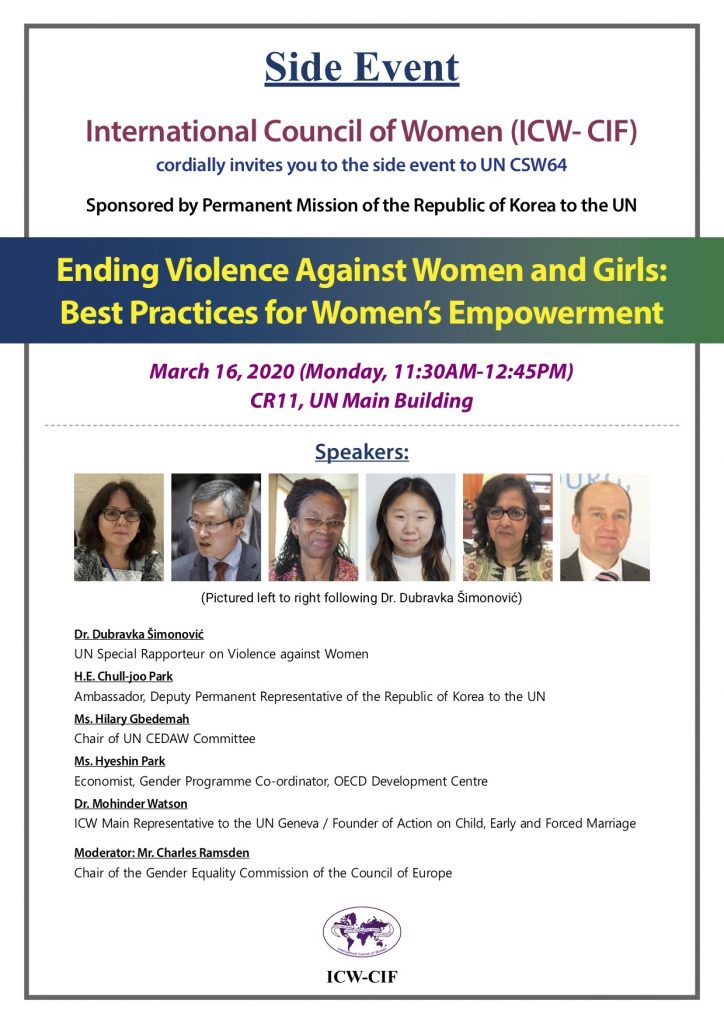
Preparations which had been undertaken for the Beijing +25 Review included:
- National-level reviews in which States were called upon to undertake a comprehensive assessment of the progress made and challenges encountered,
- Regional-level reviews in which regional commissions of the United Nations organised 5 regional reviews around the world and convened intergovernmental meetings to inform the 64thSession of the Commission, and
- Expert group meeting to assess the current context, emerging issues and prospects for gender equality and women’s rights in the future.
As part of civil society preparations, ACE&FM hadspent several months in 2019 preparing for the UNECE Regional Beijing + 25 Review and the CSO Forum in October 2019 in Geneva. In March, we planned to speak on four panels on violence against women in the context of the Beijing + 25 Regional Reviews, and to present our research on child widows conducted in 2019, an issue which remains largely hidden and unknown. The statement we presented to governments on the Working Group on Violence Against Women in October can be read here.
We like many are disappointed that this important session had to be cancelled due to this global health crisis, but we look forward to continuing this important work as we receive more information.
February 2020 OECD High Level Conference on Taking Public Action to End Violence at Home, Paris
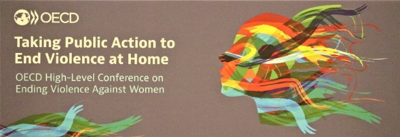
On 5-6th February, 2020, the Organisation for Economic Co-operation and Development (OECD) hosted its inaugural High-Level Conference on ending violence against women and girls (VAWG). The conference brought together leaders of OECD member countries, representatives from development, businesses, trade unions, civil society, academia and philanthropy and survivors of intimate partner violence to consider what measures governments could take to prevent, address and eliminate intimate partner violence. While it is clear that progress has been made to address gender-based violence (GBV), the key question remains: What leads some men to harm women – and how do we stop it?
OECD Secretary-General Angel Gurria stated that GBV was the most persistent and devastating human rights violation in the world affecting women at home, at work and in public. A holistic approach to intimate partner violence is needed as such violence is rarely an isolated incident but rather a pattern of ongoing abuse which requires a multi-dimensional response. Such an approach must be based on reliable and disaggregated data, social services and support for survivors, improved access to justice, and social and cultural changes which reject toxic masculinity.
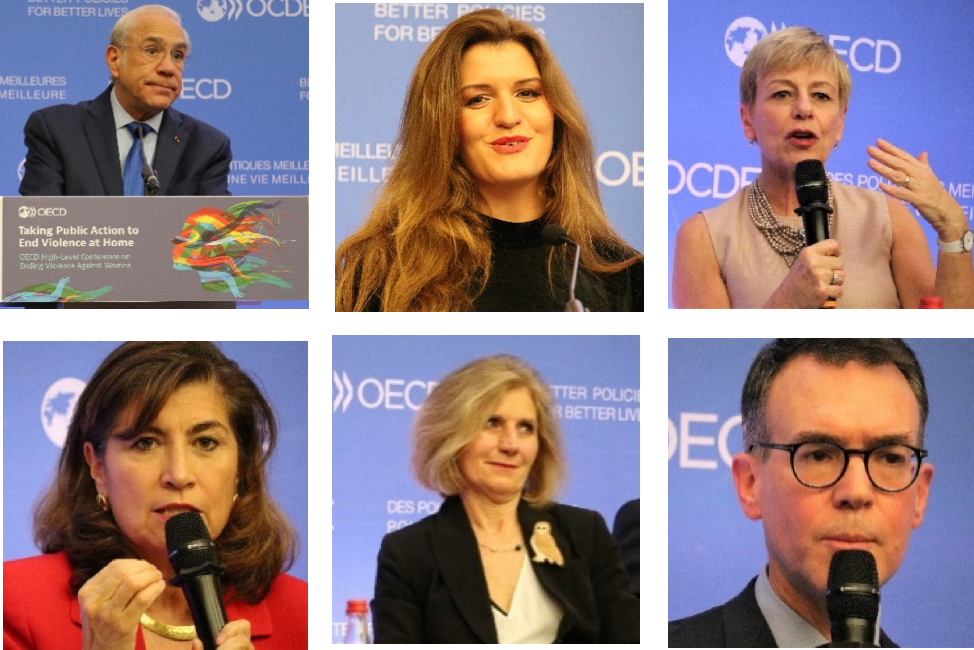
Pictured from left to right, top to bottom: OECD Secretary-General Angel Gurria; French Minister for Gender Equality Marlene Schiappa; Hilary Pennington, Executive Vice-President of the Ford Foundation; Ms. Gabriela Ramos, OECD Chief of Staff and Sherpa to the G20; Lady Anne Judith Rafferty, Lord Justice of Appeal, England and Wales and Mr Remi Boyer, Chief of Human Resources and Corporate Social Responsability Officer, Korian Group
The keynote speaker was Ms Marlene Schiappa who currently serves as the French Minister for Gender Equality. Ms Schiappa argued that men have killed women throughout history because they did not view women as people in their own right but rather as possessions to be controlled. Today, women need to be heard, and France is ready to listen actively vigorously promoting gender equality around the world. Survivor-advocates also offered their testimonies during the conference, urging that survivor’s voices must be central to efforts to eliminate gender-based and intimate partner violence.
After leading a civil society working group for the UNECE Regional Beijing +25 review on VAWG, it was greatly encouraging to attend this high-level conference and see that awareness of the issue of VAWG within the international community has increased greatly over the past twenty-five years. However, there is still much work to be done, and ACE&FM hopes to continue to play an active role in working to eliminate all forms of VAWG wherever they may occur.
January 2020 Launch of Norway’s International Strategy to Eliminate Harmful Practices by the Ministry of International Development and Partners, Geneva
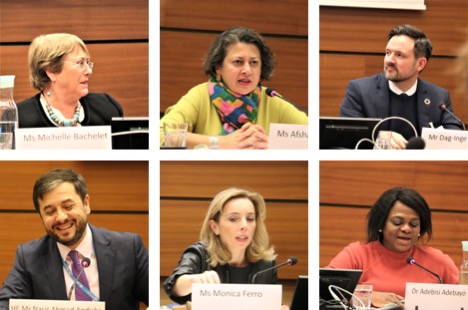
Pictured from left to right, top to bottom: Ms. Michelle Bachelet, the UN High Commissioner for Human Rights; Ms. Afshan Khan, UNICEF Regional Director for Europe and Central Asia; Mr. Dag-Inge Ulstein, Norway’s Minister of International Development; HE Mr. Nasir Ahmed Andisha, Ambassador and Permanent Representative to the UN of the Republic of Afghanistan; Ms. Monica Ferro, Director, Geneva Office, UN Population Fund (UNFPA) and Dr. Adebisi Adebayo, Program Advisor, Inter-African Committee on Traditional Practices
On 14th January 2020, Norway and partners launched Norway’s International Strategy to Eliminate Harmful Practices 2019-2023 at the Palais des Nations in Geneva. The event was entitled “Let Girls be Girls: Joining efforts to eliminate harmful practices.”
This strategy seeks to strengthen efforts to eliminate harmful practices and promote basic human rights, focusing on the harmful practices of child marriage, female genital mutilation and son preference. Panelists highlighted the importance of providing resources for global development through UN agencies such as UNICEF and UNFPA and civil society organizations as well as addressing poverty as a driving factor of many harmful traditional practices (HTPs). Such practices include FGM, child and forced marriage, honour crimes, dowry-related violence and killings, bride kidnapping and virginity testing which, as the High Commissioner for Human Rights noted, are all damaging and violations of the human rights of women and children. Mr. Dag-Inge Ulstein highlighted the urgency of addressing HTPs in the 10 years ahead as the international community moves towards reaching the targets for the 2030 Agenda for Sustainable Development. The Norwegian Minister’s full statement can be found here.
Importantly, Ms. Afshan Khan also reminded each of us that behind each statistic of the 150 million girls who will undergo child marriage in the next decade and the 60 million who will undergo FGM is a girl with hopes and dreams.
Since its inception, ACE&FM has been dedicated to advocating against child marriage and related harmful traditional practices, and we are pleased to see the launch of this important strategy by the Norwegian Ministry of International Development and its partners. To further highlight the importance of addressing these issues, we plan hold a one-day conference on harmful traditional practices in October 2020 in collaboration our NGO partners. More details on the conference will be made available soon.
December 2019 Panel discussion on violence against women and girls at the Afro-European Medical and Research Network Conference, Geneva

Mohinder Watson with panelists discussing violence against women and girls (VAWG)
In a presentation entitled “Violence Against Women and Girls: What More Should Governments Be Doing to Eradicate It in the Context of the Beijing +25 Global Review and the SDG Agenda?” Mohinder Watson discussed the impact of VAWG on women’s health and possible risk factors for intimate partner violence and sexual violence. Dr. Watson presented the main recommendations of the CSO Forum and Beijing +25 UNECE Regional Review as well as discussing the importance of a human-rights based approach to eliminating VAWG in the context of the Beijing +25 global review and SDG Agenda. Some of the key recommendations included: (1) Developing National Action Plan for VAWG based on gender mainstreaming; (2) Coordinating with all stakeholders e.g. village/tribal chiefs, paralegals, court staff, CSOs, police, judiciary, men and boys, educational institutions and employers; (3) Funding women’s full participation in civil society; (4) Scaling up VAWG prevention efforts that address unequal power relations between men and women and conducting better evaluation of pilot projects to move to large-scale programs; and (5) Using a survivor-centred approach which respects survivor’s rights, choices, wishes and confidentiality and treats them with dignity and respect.
November 2019 Round Table Discussion on Cyber VAWG at the Annual Meeting of the American Society for Criminology, Marriott Marquis Hotel, San Francisco
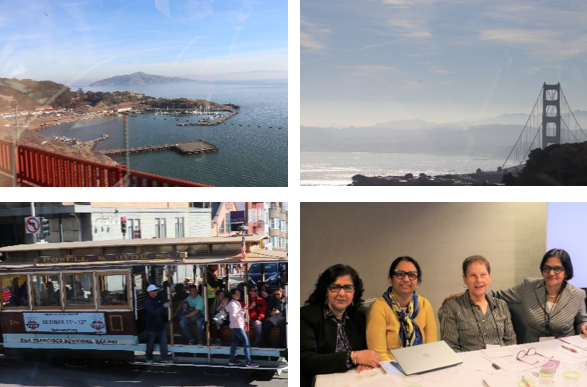
Panellists pictured are Dr. Susan Kunkle, Kent State University; Dr. Shanta Goswami Varma, Auburn University Montgomery; Dr. Mohinder Watson, Founder, ACE&FM and Dr. Prit Kaur, Auburn University Montgomery
In the 21st century, cyber violence has become a major threat to women and girls. Compared to men, female internet users suffer more from cybercrimes, fraud and abuse, including sexual extortion, revenge porn and online staking. The internet is thus used as a tool to humiliate, stigmatise and undermine their social reputation. During the round table, panellists discussed cyber harassment, the influence of social media, human trafficking in the context of global migration, and the concerning trend of viral rapes.
Dr. Mohinder Watson addressed human trafficking and the influence of the internet on the exploitation of women and girls. She noted that:
- Trafficking affects over 40 million people across least 165 countries
- It is a gendered experience as over 70% of those trafficked are women and girls
- Over 80% of victims are trafficked for sexual exploitation, so the demand for prostitution and other forms of sexual exploitation must be addressed
- Current laws are inadequate to fight trafficking
- Solutions include increasing economic opportunity in home countries, involving internet providers and platforms in the fight against cyber trafficking and providing safe, legal channels for migration (e.g. the UN Global Compact for Safe, Orderly and Regular Migration)
- The CEDAW committee is working on a General Recommendation to help better respond to the needs of survivors of human trafficking.
- UNODC fights trafficking through legal and policy frameworks, provides data and finds ways to identify and prosecute criminals through international cooperation.
- However, much more remains to be done to prosecute traffickers and protect survivors.
November 2019 Meeting with Bandana Rana, Vice Chair of CEDAW, and Lily Thapa, Founder of WHR Nepal; Geneva
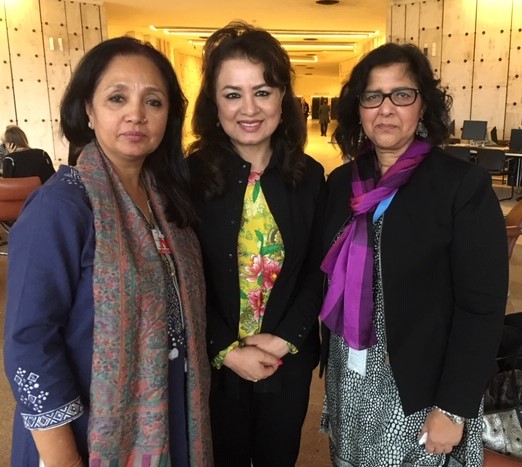
From left to right: Lily Thapa, Bandana Rana, Mohinder Watson
October 2019 Side event during the UNECE Beijing +25 Regional Review “Ending Violence Against Women and Girls: Prevalence, Proposals and Partnerships“
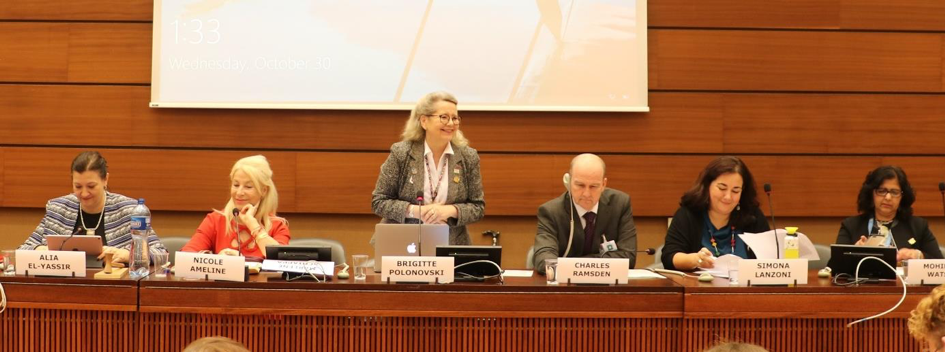
From left to right: Alia El-Yassir, Nicole Ameline, Brigitte Polonovski, Charles Ramsden, Simona Lanzoni, Mohinder Watson
September 2019 Side event during the 42nd session of the Human Rights Council “Widows in Crisis and Conflict”
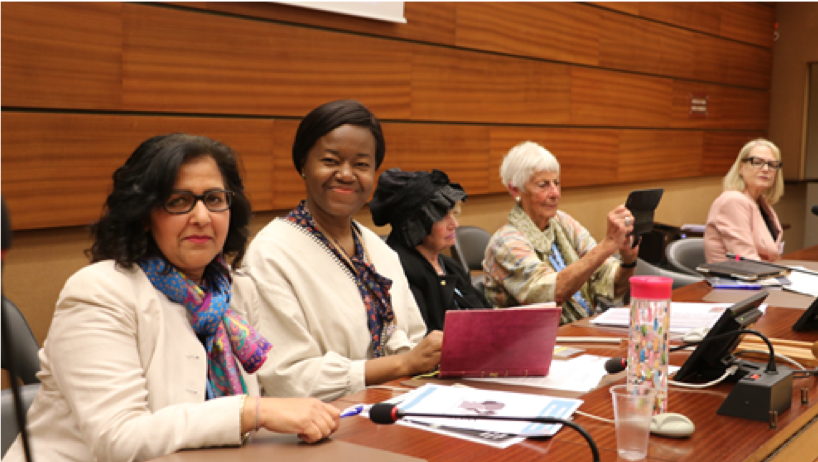
From left to right: Mohinder Watson, Caroline Ouaffo Wafang, Lois Herman, Margaret Owen, Lori Post
July 2019 Panel Discussion on Women’s Rights in Conflict: Challenges and Threats at the 41st Session of United Nations Human Rights Council, Palais des Nations, Geneva
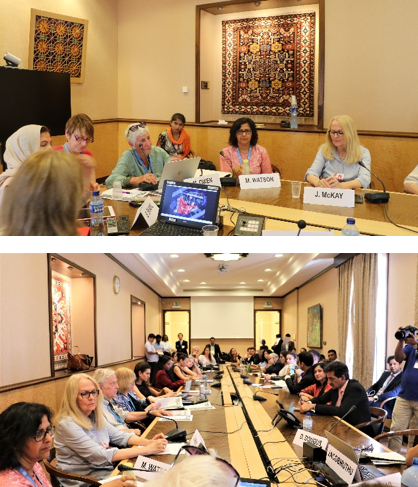
Panellists pictured included Mr. Shamin Shawl, Main Representative of IMWU in Geneva; MP Julie Ward representing the North West of England (via Skype); Dr. Mohinder Watson, Founder, ACE&FM; Ms. Margaret Owen, OBE, Founder and Director of Widows for Peace through Democracy; Ms. Daniliya Dongus, Representative of Scales for Justice; Ms. Jennifer McKay and Ms. Zarin Hainsworth, OBE, who served as the moderator.
ACE&FM was invited by the International Muslim Women’s Union (IMWU) to take part in a panel on women’s rights in conflict during the 41st Session of the Human Rights Council. Dr. Watson spoke about the trafficking of young girls from India to Kashmir for the purposes of child marriage. Many girls were lured by promises of work and money, and some were shown photos of handsome young men they believed to be their future husbands, only to find a man old enough to be their father or grandfather waiting for them when they arrived. Once they arrived in Kashmir, with no money or support, these girls were even more vulnerable to further exploitation.
June 2019 Meeting with the new Chairperson of the Committee on the Rights of the Child, Geneva
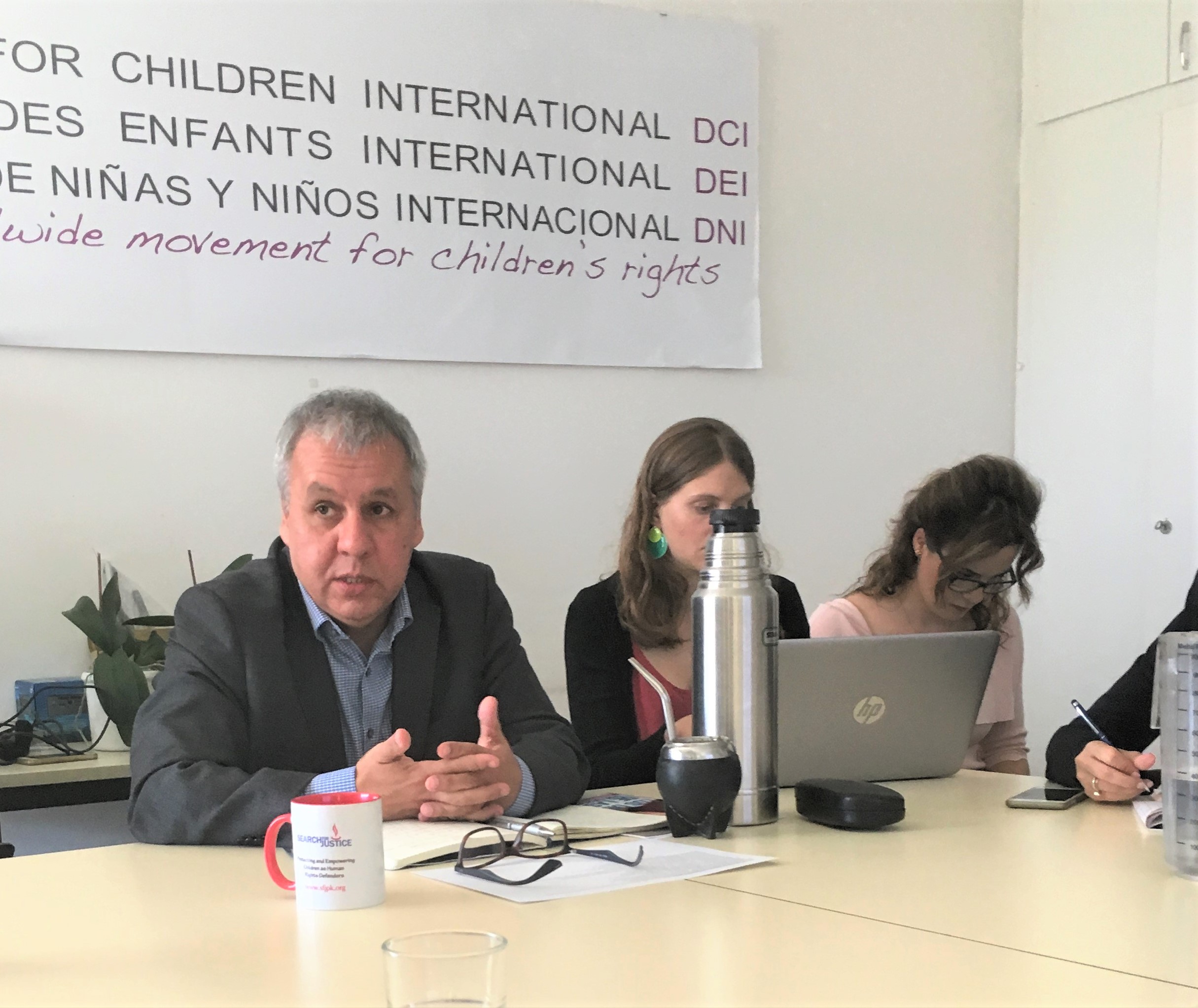
Informal meeting with the new Chairperson of the Committee on the Rights of the Child, Luis Ernesto Pedernera Reyna, hosted by Child Rights Connect and attended by various NGOs, including Save the Children and Plan International
June 2019 Side event during the 41st Human Rights Council presenting a new report, “Child Widows’ Needs and How to Support Them,” by Mohinder Watson

Mohinder Watson presenting new research on child widows in Geneva
April 2019 UN Network on Migration Consultation, Geneva

From left to right, top to bottom: Antonio Vitorino, Secretary General of IOM; Felipe González Morales, Special Rapporteur on the Human Rights of Migrants; Nyaradzo Chari-Imbayago, Coordinator of the UN Network on Migration; Mohinder Watson pictured with delegates from Malaysia, Nigeria and staff from the United Nations Office on Drugs and Crime
March 2019 Geneva Summit for Human Rights and Democracy
March 2019 Periodic Meeting of Geneva-Based NGOs with the High Commissioner for Human Rights, Palais Wilson, Geneva
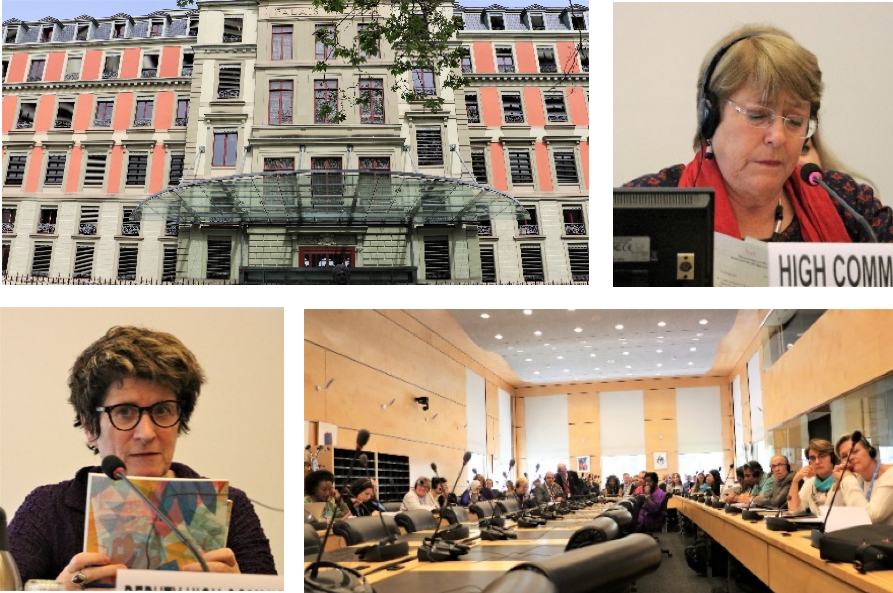
From right to left, top to bottom: Palais Wilson; Michelle Bachelet, UN High Commissioner for Human Rights; Kate Gilmore, Deputy High Commissioner for Human Rights; NGO representatives
In March 2019, NGOs with representation in Geneva were invited to one of the periodic meetings organised by Michelle Bachelet, the High Commissioner for Human Rights, and her senior team at the Office of the High Commission for Human Rights (OHCHR).
The March agenda was dominated by concerns surrounding proposed cuts in the UN budget which would affect the functioning of the UN treaty bodies. The Chairpersons of all ten treaty bodies were informed that six of them were very likely to have to postpone some of their planned sessions in 2019 due to a financial shortfall caused by delayed Member State contributions to the UN.
The six committees at most risk are:
- the Human Rights Committee,
- the Committee on the Rights of the Child,
- the Committee on the Elimination of all forms of Discrimination Against Women,
- the Committee Against Torture,
- the Committee on the Elimination of Racial Discrimination, and
- the Subcommittee on the Prevention of Torture.
The Chairpersons of the ten Committees were deeply concerned about the consequences of cancelling these sessions and had written a letter to the UN Secretary General and the High Commissioner for Human Rights, requesting that they, together with Member States, find an urgent solution to address this situation.
It was noted that despite its important mandate, OHCHR only receives 3.7% of the total UN budget, which is already insufficient for its goal of promoting and protecting human rights around the world.
NGOs also expressed their deep concern at these developments. Such cuts would affect periodic reviews already scheduled with States as well as the consideration of complaints by individual victims of serious human rights violations. Cancelling these sessions would undermine the systems established by States to protect human rights and would lead to many negative consequences.
March 2019 63rd Commission on the Status of Women, New York

From left to right, top to bottom: Mohinder Watson pictured with Gertrude Mongella, Secretary General of the UN Fourth World Conference on Women in Beijing; Panel discussion on birth registration at office of the Organisation internationale de la Francophonie (OIF) in New York; Margaret Own and Mohinder Watson at UN Women; Karen Pierce, the UK’s Permanent Representative to the United Nations; Her Royal Highness, the Countess of Wessex at the Ambassador’s Reception
Reflections from CSW 63
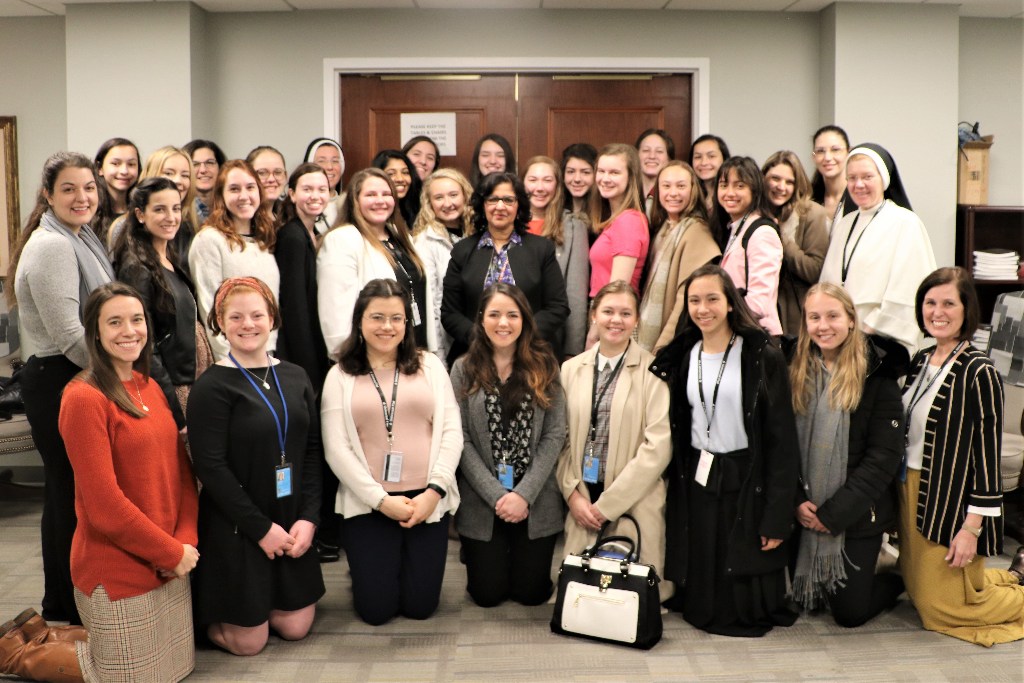
Mohinder Watson speaking with a group of young women during CSW63
“During the 63rd meeting of the UN Commission on the Status of Women, Mohinder Watson spoke to the Fiat Girls, a group of high school and college girls including myself who travelled to New York to learn about the issues facing women around the world and how Catholic social teaching can be used to address them with compassion and consideration. Over coffee and donuts, Mohinder shared with us her story of escaping a planned marriage as a teenager in the UK and her journey towards healing, empowerment, and advocacy. What struck me the most about Mohinder’s testimony was her resilience and kindness of spirit. Child, early and forced marriage is an issue that fundamentally damages a girl’s relationship to her culture and her family, and it takes incredible courage to recognize one’s own voice and agency in those situations, and it takes even more to share that story with the world. Thank you, Mohinder, for your advocacy, bravery, and wisdom.” ~Jule Voss, Fiat Girl 2019
March 2019 International Conference on Child Marriage and Temporary Marriage in the Middle East; Sigmund Freud University, Vienna

From left to right, top to bottom: Her Excellency, Ms. Khojasta Fana Ebrahimkhel, Ambassador of Afghanistan to the UN; Panel discussion on child marriage; Conference participants; Mohinder Watson speaking on child marriage
January 2019 South Asian Regional Women’s Conference; Kathmandu, Nepal

Panelists at the South Asian Regional Women’s Conference

Images from our visit to the Bikalpa Aangan School and surrounding area in Kathmandu, permission courtesy of Stella T. and her team
Bikalpa Aangan School was a happy and stimulating space for young children from the surrounding area—albeit with minimum facilities compared to what these children deserve. Thank you to Stella T. and her team for showing us this important project and introducing us to some of the local residents. Their hard work and dedication over the past 15 years has built Bikalpa Aangan School into a beacon of light for the community and its children.
December 2018 Presentation at the Afro-European Medical and Research Network, Geneva

From left to right, top to bottom: Mohinder Watson presenting on child widows; Participants discussing diaspora support for Sierra Leone and other countries; Mohinder Watson pictured with the Deputy Ambassador and Permanent Representative of Sierra Leone to the UN; Members of the Afro-European Medical Research Network with the Deputy Ambassador
December 2018 Youth panel moderated by Michele Bachelet, UN High Commissioner for Human Rights, celebrates the 70th anniversary of the UDHR

Images from UDHR youth panel with Roben X (top left), a talented US rapper and social activist
November 2018 Seminar on Widows of All Ages at the European Parliament, Brussels
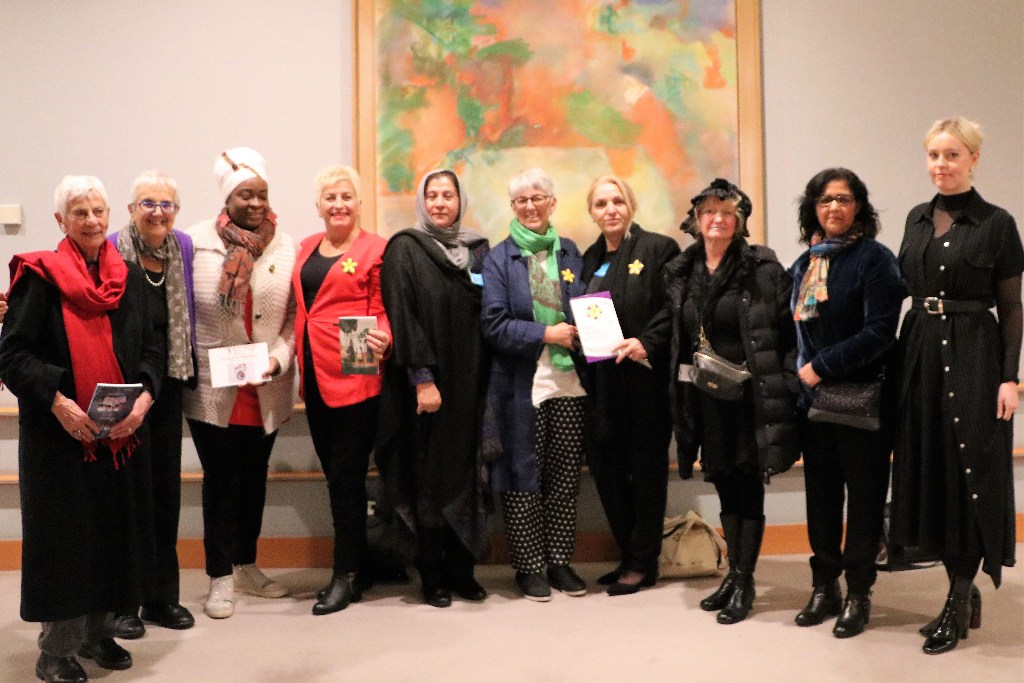
From left to right: Margaret Owen, Pat Holden, Belgian/Congo colleague, Violetta Berisha, Shamin Shawl, Julie Ward, Kadire Tahiraj, Lois A. Herman, Mohinder Watson, Cleo Newton
Hosted by UK MEP Julie Ward representing NW of England, this event brought together a distinguished group of experts on widow abuse and discrimination at the European Parliament in Brussels. Presentations included “Why Widowhood is Now a Development as well as a Human Rights and Gender Issue” from Margaret Owen, “Millions of Child Widows Invisible, Forgotten and Vulnerable—What Can the European Parliament Do?” by Mohinder Watson based on Action on Child, Early and Forced Marraige’s July 2018 report of the same name, personal testimony from Kadire Tahiraj about her experiences in Kosovo, and “Kashmir and its Widows and Half-Widows” by Shamin Shawl.
October 2018 Meeting with the CEDAW Delegation from Nepal at the UN in Geneva
Those pictured include Lily Thapa, Founder and President of Women for Human Rights in Nepal; Bandana Rana, Nepali CEDAW member and the Honorable Mona Ansari from the Human Rights Commission in Nepal
October 2018 Televised debate on child marriage at the European Parliament, Brussels
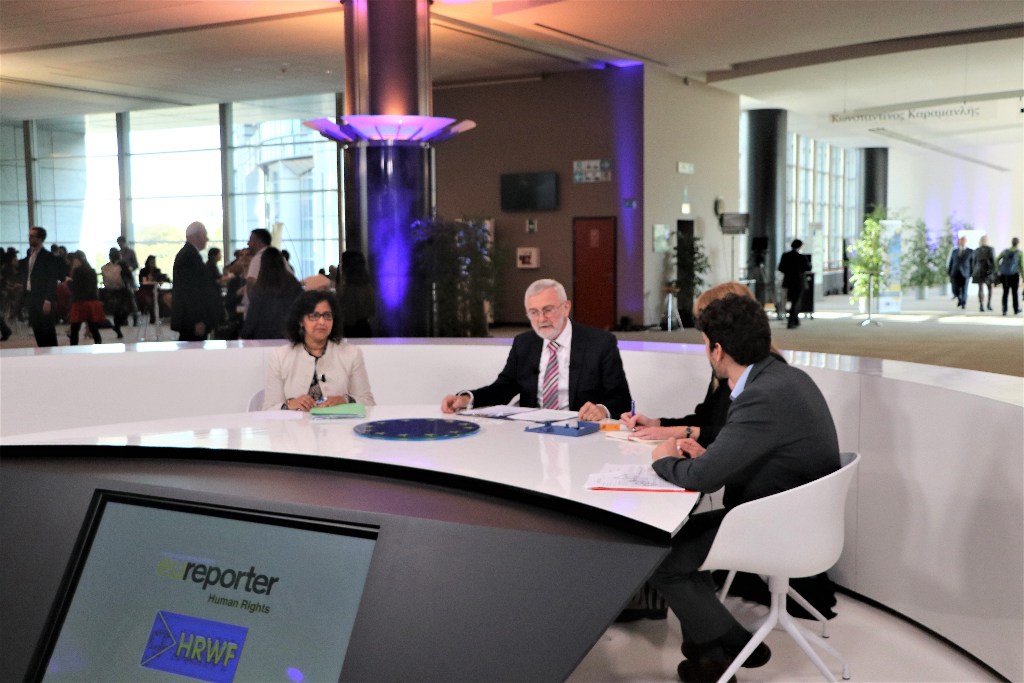
TV debate with Mohinder Watson
October 2018 Global Consultation of the World Council of Churches; Kingston, Jamaica

Images from the Global Consultation of the World Council of Churches
September 2018 Kowani Indonesian Women’s Conference; Yogyakarta, Indonesia

From left to right, top to bottom: Joko Widodo, President of Indonesia, with Dr. Jungsook Kim, President of the International Council of Women; Mohinder Watson delivering a speech on violence against women and girls (VAWG); School children performing a traditional Indonesian dance; Participants in the Conference from over 1,000 Indonesian NGOs; Seleima D. Veisamasama, Ambassador of Fuji to Indonesia, pictured with Mohinder Watson
July 2018 Nelson Mandela centennial event hosted by Her Excellency, Ms. Nozipho Joyce Mxakato-Diseko, Permanent Representative of the Republic of South Africa to the UN

(Centre) The Honorable Mogoeng Mogoeng, Chief Justice of South Africa, pictured with Mohinder Watson after addressing the Council Chamber
“We can change the world and make it a better place. It is in your hands to make a difference.” ~Nelson Mandela
July 2018 CEDAW Briefing; Palais des Nations, Geneva
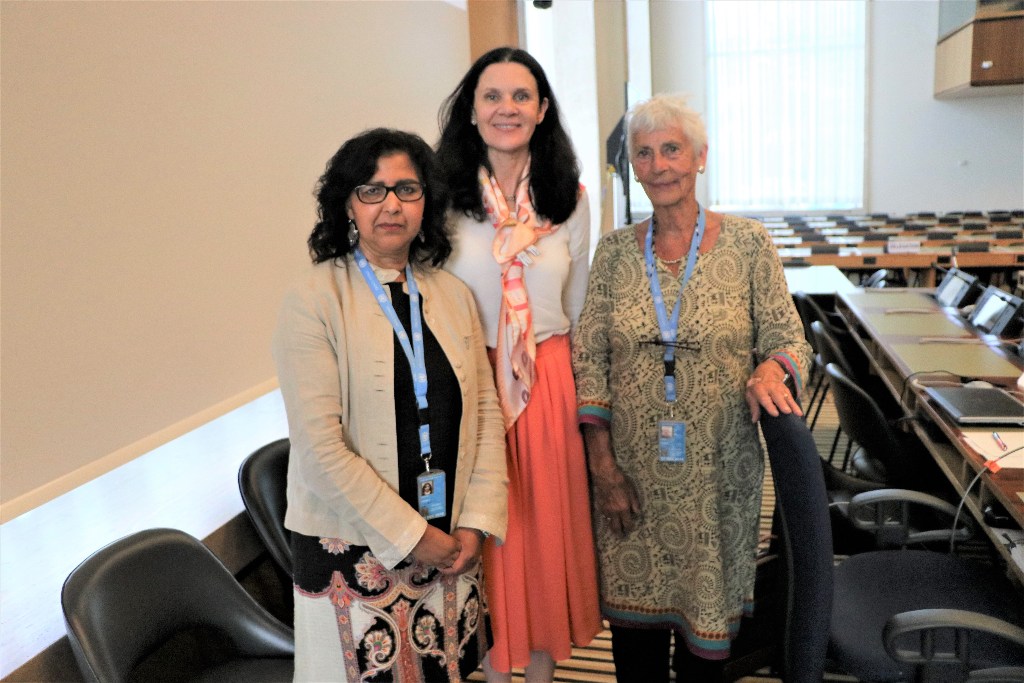
From left to right: Mohinder Watson; Delia Leinarte, CEDAW Chair; Margaret Owen, Director of Widows for Peace through Democracy
Mohinder Watson presented Action on Child, Early and Forced Marriage’s report “Millions of Child Widows, Forgotten, Invisible and Vulnerable” at a briefing with CEDAW committee members on 16th July 2018. This report serves to highlight the plight of child widows, a neglected group of over a million vulnerable children who suffer the triple disadvantages of gender, age, and widowhood status.
June 2018 38th session of the Human Rights Council, Geneva

Mohinder Watson speaking on a panel at the Human Rights Council in Geneva
March 2018 62nd Commission on the Status of Women, New York

